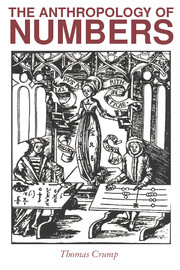Book contents
- Frontmatter
- Contents
- List of illustrations
- Preface
- Acknowledgements
- 1 The ontology of number
- 2 The cognitive foundations of numeracy
- 3 Number and language
- 4 Cosmology and ethnoscience
- 5 Economy, society and politics
- 6 Measurement, comparison and equivalence
- 7 Time
- 8 Money
- 9 Music, poetry and dance
- 10 Games and chance
- 11 Art and architecture
- 12 The ecology of number
- Notes
- References
- Index
- Cambridge Studies in Social and Cultural Anthropology
1 - The ontology of number
Published online by Cambridge University Press: 05 June 2012
- Frontmatter
- Contents
- List of illustrations
- Preface
- Acknowledgements
- 1 The ontology of number
- 2 The cognitive foundations of numeracy
- 3 Number and language
- 4 Cosmology and ethnoscience
- 5 Economy, society and politics
- 6 Measurement, comparison and equivalence
- 7 Time
- 8 Money
- 9 Music, poetry and dance
- 10 Games and chance
- 11 Art and architecture
- 12 The ecology of number
- Notes
- References
- Index
- Cambridge Studies in Social and Cultural Anthropology
Summary
The ontogenesis of number
This day and age we're living in give cause for apprehension,
With speed and new invention,
And things like third dimension,
Yet we get a trifle weary, with Mr. Einstein's theory,
So we must get down to earth,
At times relieve the tension.
No matter what the progress, or what may yet be proved,
The simple facts of life are such they cannot be removed.
The fundamental things apply,
As time goes by.
Herman Hupfeld, 1930When it comes to mankind's use and understanding of numbers, what are the simple facts of life? Are there any fundamental things which always apply? Are numbers part of a reality which exists independently of the lives and deaths of individual human beings and the rise and fall of civilizations’? (Restivo 1983: 231). If this is so, then the characteristics of numbers are largely defined in terms of the ways in which they can combine with one another, according to the rules of what we call ‘mathematics’, or, in confining its application to numbers, simply ‘arithmetic’. In that case, following Frege, we are confronted with ‘the principal problem of arithmetic.[…]How do we apprehend logical objects, in particular numbers?’ (Cited Hodes 1984). But whatever may be fundamental about numbers, one must still ask what are the simple facts of life, and much of this book is an attempt to answer this question in its relation to numbers.
- Type
- Chapter
- Information
- The Anthropology of Numbers , pp. 1 - 13Publisher: Cambridge University PressPrint publication year: 1990



